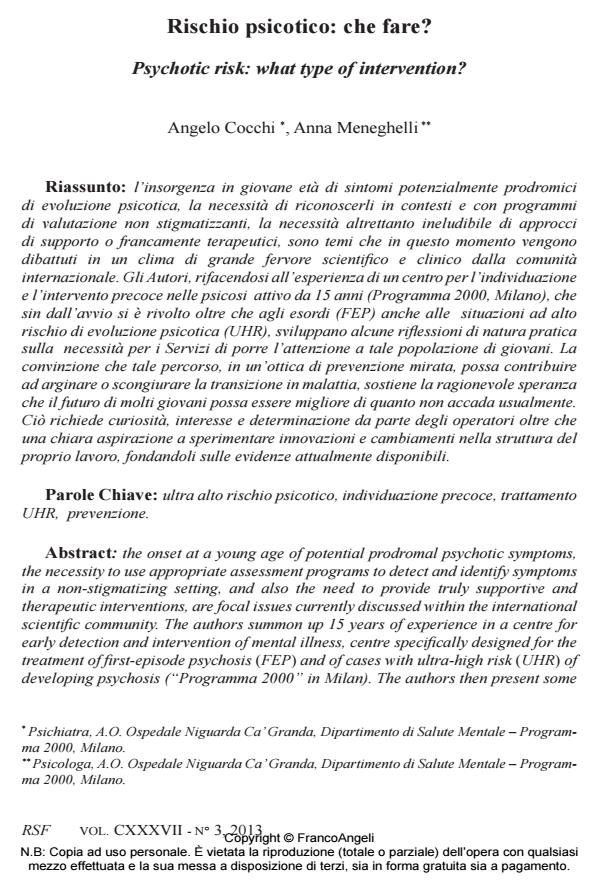Psychotic risk: what type of intervention?
Journal title RIVISTA SPERIMENTALE DI FRENIATRIA
Author/s Angelo Cocchi, Anna Meneghelli
Publishing Year 2013 Issue 2013/3
Language Italian Pages 25 P. 131-155 File size 394 KB
DOI 10.3280/RSF2013-003007
DOI is like a bar code for intellectual property: to have more infomation
click here
Below, you can see the article first page
If you want to buy this article in PDF format, you can do it, following the instructions to buy download credits

FrancoAngeli is member of Publishers International Linking Association, Inc (PILA), a not-for-profit association which run the CrossRef service enabling links to and from online scholarly content.
The onset at a young age of potential prodromal psychotic symptoms, the necessity to use appropriate assessment programs to detect and identify symptoms in a non-stigmatizing setting, and also the need to provide truly supportive and therapeutic interventions, are focal issues currently discussed within the international scientific community. The authors summon up 15 years of experience in a centre for early detection and intervention of mental illness, centre specifically designed for the treatment of first-episode psychosis (FEP) and of cases with ultra-high risk (UHR) of developing psychosis ("Programma 2000" in Milan). The authors then present some practical ideas on how mental health services can respond to a younger population’s needs. The conviction that early detection may help to prevent the transition to psychosis, or at least may reduce the severity of the disease, supports the hope that the future of many young people may be improved. The health personnel of such services must be highly motivated, interested and curious, and express as well a clear desire to experience in the workplace evidence based innovations.
Keywords: Ultra high psychotic risk, early detection, UHR treatment, prevention.
- Early Intervention Services for youth at Clinical High-Risk for Psychosis: The Reggio Emilia At-Risk Mental State (ReARMS) experience Michele Poletti, in RIVISTA SPERIMENTALE DI FRENIATRIA 3/2022 pp.61
DOI: 10.3280/RSF2022-003004
Angelo Cocchi, Anna Meneghelli, Rischio psicotico: che fare? in "RIVISTA SPERIMENTALE DI FRENIATRIA" 3/2013, pp 131-155, DOI: 10.3280/RSF2013-003007